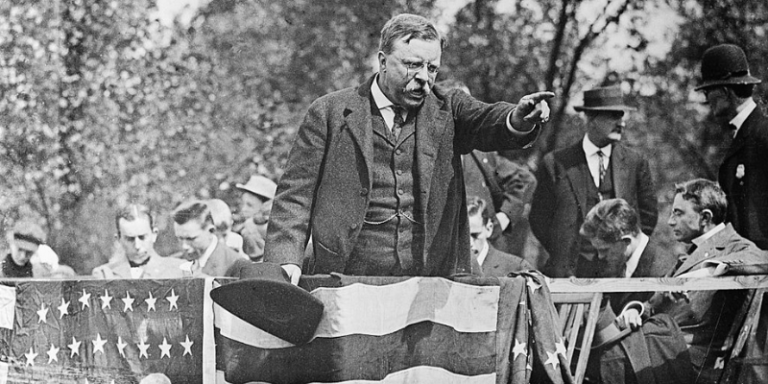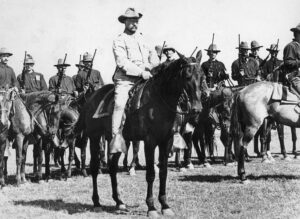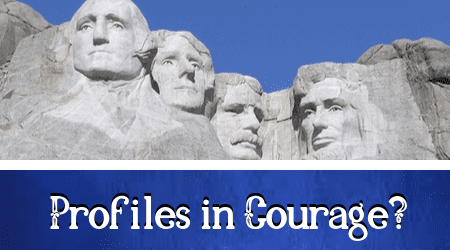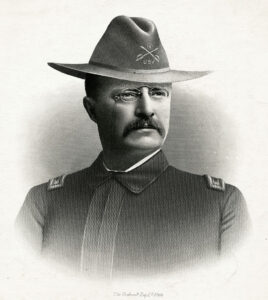Theodore Roosevelt: The Rough Rider
Roosevelt became a national hero after his service in the Spanish-American War.
By: Kelli Ballard | November 28, 2020 | 637 Words

(Getty Images)
Theodore “Teddy” Roosevelt was the 26th president of the United States – but that hadn’t been the plan. Some Republicans didn’t like him and didn’t want him to remain governor of New York. They planned to get rid of him by having him run as William McKinley’s running mate – but McKinley won, was assassinated, and then Roosevelt became president.
Early Life
Roosevelt was born on October 27, 1858. He graduated from Harvard College in 1880 and married his first wife, Alice Hathaway Lee. In 1884, his wife and mother died on the same day and Roosevelt, sick with grief, spent the next two years in the Badlands of the Dakota Territory on his ranch. He spent the time hunting and serving as a frontier sheriff. He later returned to New York and married his childhood sweetheart, Edith Kermit Carow.

Theodore Roosevelt and the Rough Riders. (Getty Images)
Politics
Roosevelt ran for mayor of New York City and lost – twice. But he later became popular for his service during the Spanish-American War. He became a colonel in the First U.S. Volunteer Cavalry, known as the “Rough Riders.” In Cuba, he led his men in a charge in the Battle of San Juan which earned him the status as one of the war’s most visible heroes.
The Republicans threw their support on Teddy when he returned to New York, helping him become governor. However, when he showed that he would not bow down to pressure from party big wigs, Thomas C. Platt conspired with others to have Roosevelt as McKinley’s running mate – all of this just to keep him from being re-elected governor. Was the joke on them? McKinley and Roosevelt won in a landslide.
Presidency
On September 6, 1901, anarchist Leon Czolgosz shot McKinley at the Pan-American Exposition in New York. Eight days later, Roosevelt became the 26th president at the age of 42.

Roosevelt’s “Square Deal” was a promise to the people to battle large corporations and industrial companies that wanted to restrain trades. In 1902, he negotiated a modest pay raise for miners, stopping a coal strike in Pennsylvania. That same year, in June, the president passed the National Reclamation Act. This set aside nearly 200 million acres for national forests, wildlife refuges, and reserves. This was almost five times more than all previous presidents combined.
He believed that America should “speak softly and carry a big stick” in international affairs and that presidents should not be afraid to use force if necessary to back up diplomatic negotiations.

(Getty Images)
Roosevelt helped Panama secede from Columbia in 1903 to help start the construction on the Panama Canal, which was, according to him, his greatest presidential achievement. Some of the European nations were using forceful tactics to try and collect on debts owed to them by Latin American Nations. The president intervened and promised to police the globe, making sure that countries paid their international debts.
Roosevelt also built up the nation’s defenses so that the Navy was a major international force by the end of his presidency. He negotiated an end to the Russo-Japanese War in 1904-05 and even won the Nobel Peace Prize for his actions.
Roosevelt had promised not to run for re-election in 1908, so he didn’t. This led to Howard Taft becoming president, with Roosevelt’s support. But Taft didn’t live up to Roosevelt’s expectations, so Roosevelt campaigned against him later.
Roosevelt was shot in the chest by a fanatic while campaigning in Milwaukee, but recovered quickly. Democrat Woodrow Wilson won the election with 435 electoral votes to Roosevelt’s 88 … Taft only gained eight. This party split was the most successful in American history and led to many of Roosevelt’s progressive plans being echoed in the Wilson presidency.
















